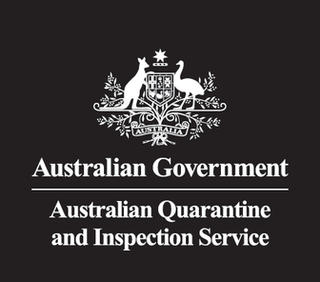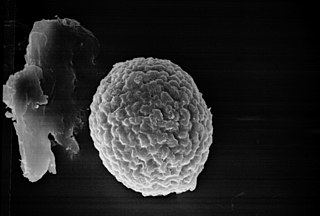
Organic certification is a certification process for producers of organic food and other organic agricultural products. In general, any business directly involved in food production can be certified, including seed suppliers, farmers, food processors, retailers and restaurants. A lesser known counterpart is certification for organic textiles that includes certification of textile products made from organically grown fibres.

The Animal and Plant Health Inspection Service (APHIS) is an agency of the United States Department of Agriculture (USDA) based in Riverdale, Maryland responsible for protecting animal health, animal welfare, and plant health. APHIS is the lead agency for collaboration with other agencies to protect U.S. agriculture from invasive pests and diseases. APHIS is the National Plant Protection Authority for the U.S. government, and the agency's head of veterinary services is Chief Veterinary Officer of the United States.
The Canadian Food Inspection Agency is a regulatory agency that is dedicated to the safeguarding of food, plants, and animals (FPA) in Canada, thus enhancing the health and well-being of Canada's people, environment and economy. The agency is governed by the Minister of Agriculture and Agri-Food and Minister of Health.

Non-tariff barriers to trade are trade barriers that restrict imports or exports of goods or services through mechanisms other than the simple imposition of tariffs.

The Australian Quarantine and Inspection Service (AQIS) was the Australian government agency responsible for enforcing Australian quarantine laws, as part of the Department of Agriculture.

Karnal bunt is a fungal disease of wheat, durum wheat, and triticale. The smut fungus Tilletia indica, a basidiomycete, invades the kernels and obtains nutrients from the endosperm, leaving behind waste products with a disagreeable odor that makes bunted kernels too unpalatable for use in flour or pasta. While Karnal bunt generally does not lead to devastating crop losses, it has the potential to dramatically decrease yield and poses additional economic concerns through quarantines which limit the export of suspected infectious wheat products from certain areas, including the U.S. Several chemical control methods exist for Karnal bunt of wheat, but much work remains to be done in identifying resistant host varieties.

The khapra beetle, also called cabinet beetle, which originated in South Asia, is one of the world's most destructive pests of grain products and seeds. It is considered one of the 100 worst invasive species in the world. Infestations are difficult to control because of the insect's ability to survive without food for long periods, its preference for dry conditions and low-moisture food, and its resistance to many insecticides. There is a federal quarantine restricting the importation of rice into the U.S. from countries with known infestations of the beetle. Khapra beetle infestation can spoil otherwise valuable trade goods and threaten significant economic losses if introduced to a new area. Handling or consuming contaminated grain and seed products can lead to health issues such as skin irritation and gastrointestinal distress.
PPQ may refer to:
The Smuggling Interdiction and Trade Compliance Program is a component of the United States Department of Agriculture (USDA) Animal and Plant Health Inspection Service (APHIS), Plant Protection and Quarantine (PPQ). The mission of the Smuggling Interdiction and Trade Compliance Program is to detect and prevent the unlawful entry and distribution of prohibited and/or non-compliant products that may harbor exotic plant and animal pests, diseases or invasive species.
President Chester A. Arthur signed the Animal Industry Act on May 29, 1884 creating the Bureau of Animal Industry (BAI), an organization that was established under the United States Department of Agriculture. It replaced the Veterinary Division that had been created by the Commissioner of Agriculture in 1883, which had taken over for the Treasury Cattle Commission, Department of Treasury.

The Federal Plant Pest Act of 1957 prohibited the movement of pests from a foreign country into or through the United States unless authorized by United States Department of Agriculture (USDA).

The North American Plant Protection Organization (NAPPO), is the phytosanitary standard setting organization recognized by the North American Free Trade Agreement (NAFTA). It was created in 1976 as a regional organization of the International Plant Protection Convention (IPPC) of the Food and Agriculture Organization (FAO) of the United Nations. Previously based in Ottawa, Ontario, it is now headquartered in Raleigh, North Carolina.
An agricultural attaché is a diplomat who collects, analyzes, and acts on information on agriculture, agribusiness, food, and other related spheres in a foreign country or countries. Agricultural attachés may be directly employed by the sending country's agriculture ministry, or they may be employed by the foreign ministry. Typical activities of an agricultural attaché include reporting on crop conditions, food availability, domestic agricultural policy and the foreign trade outlook in agricultural commodities; negotiating food aid agreements and agricultural credit lines; implementing agricultural technical assistance programs; facilitating professional contacts, exchanges, and technology transfer; assisting in negotiating bilateral and multilateral trade agreements; and promoting the exports of agricultural and food products. In many cases, agricultural attachés may also bear responsibility for issues related to the environment, food security, food safety, fisheries, forestry, and indeed anything related to rural areas and the rural economy.
Plant Protection and Quarantine (PPQ) is one of six operational program units within the Animal and Plant Health Inspection Service (APHIS) of the United States Department of Agriculture (USDA). The PPQ works to safeguard agriculture and natural resources in the U.S. against the entry, establishment, and spread of animal and plant pests and noxious weeds, to help ensure an abundant, high-quality, and varied food supply.
Phytosanitary certification is used to attest that consignments meet phytosanitary import requirements and is undertaken by an NPPO. A phytosanitary certificate for export or for re-export can be issued only by a public officer who is technically qualified and duly authorized by an NPPO.

The Department of Agriculture, Fisheries and Forestry (DAFF) was an Australian government department that existed between 1998 and 2013, when it was renamed as the Department of Agriculture. DAFF's role was to develop and implement policies and programs that ensure Australia's agricultural, fisheries, food and forestry industries remained competitive, profitable and sustainable.

The Directorate General of Customs and Excise is an Indonesian government agency under Ministry of Finance that serves the community in the field of customs and excise. The Directorate General of Customs and Excise has the duty to organize the formulation and implementation of policies in the field of supervision, law enforcement, service and optimization of state revenue in the field of customs and excise in accordance with the provisions of legislation. The directorate also carry out some basic tasks of the Ministry of Finance in the field of customs and excise, in accordance with policies established by the Minister and securing government policies relating to the traffic of goods entering or leaving the Customs Area and the collection of import duties and excise and other state levies based on legislation apply.
The National Veterinary Services Laboratories (NVSL) provides laboratory services for the US Department of Agriculture's Animal and Plant Health Inspection Service (APHIS). It operates from Ames, Iowa and Plum Island Animal Disease Center at Plum Island. The NVSL provides a wide variety of information and services, centered on diagnosis of domestic and foreign animal diseases, support of disease control and eradication programs, reagents for diagnostic testing, training, and laboratory certification.
Pest risk analysis (PRA) is a form of risk analysis conducted by regulatory plant health authorities to identify the appropriate phytosanitary measures required to protect plant resources against new or emerging pests and regulated pests of plants or plant products. Specifically pest risk analysis is a term used within the International Plant Protection Convention (IPPC) and is defined within the glossary of phytosanitary terms. as "the process of evaluating biological or other scientific and economic evidence to determine whether an organism is a pest, whether it should be regulated, and the strength of any phytosanitary measures to be taken against it". In a phytosanitary context, the term plant pest, or simply pest, refers to any species, strain or biotype of plant, animal or pathogenic agent injurious to plants or plant products and includes plant pathogenic bacteria, fungi, fungus-like organisms, viruses and virus like organisms, as well as insects, mites, nematodes and weeds.
Phytosanitary irradiation is a treatment that uses ionizing radiation on commodities, such as fruits and vegetables to inactivate pests, such as insects. This method is used for international food trade as a means to prevent spread of non-native organisms. It is used as an alternative to conventional techniques, which includes heat treatment, cold treatment, pesticide sprays, high pressure treatment, cleaning, waxing or chemical fumigation. It is often used on spices, grains, and non-food items. It inhibits the species reproduction cycle by destroying nuclear material primarily, whereas other methods are measured by species mortality. Each country has different effective approved dosages, although most follow guidelines established by the IPPC which has issued guidelines referred to as the International Standards for Phytosanitary Measures (ISPM). The most commonly used dose is 400 Gy based on USDA-APHIS guidelines.